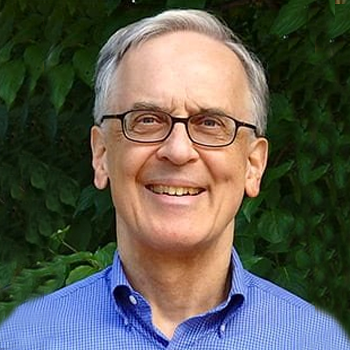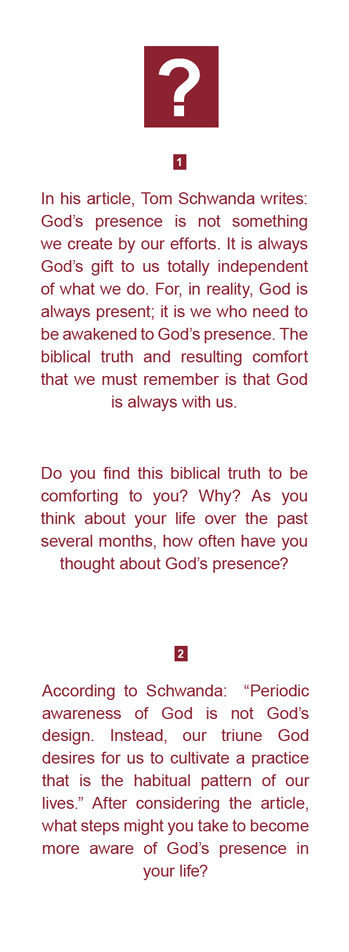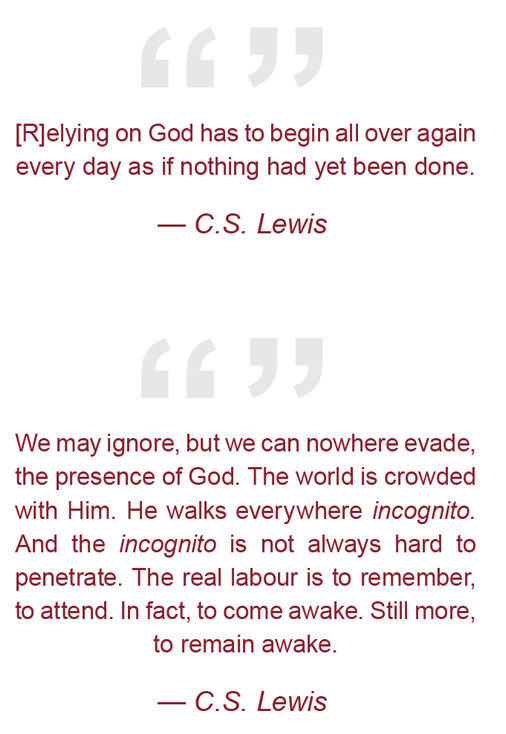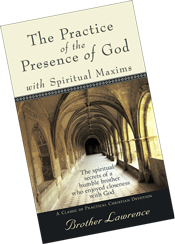Back to series


Recommended Reading:

Cultivating Attentiveness to God's Presence
Click here to open a Print-Friendly PDF
This is the second of a three–part series on “Growing in Intimacy with God.” The first article, titled “Biblical Foundations for Growing in Intimacy with God” was published in the Spring 2019 issue of Knowing & Doing. The third article will consider various ways in which we can experience God in the different arenas of life.
 God is in our midst, and we are often unaware of His presence. In the first article of this series, I presented a biblical foundation for growing in intimacy with God. Scripture reveals God’s deep desire to be in fellowship with us and the hunger of the human soul for a relationship with Him. God always takes the initiative by His grace and seeks to draw us back into a personal friendship. Central to this relationship is understanding the dynamics of knowing God. Since God has already revealed Himself to us, we need to be alert to recognize that God is indeed present and active in our world today.
God is in our midst, and we are often unaware of His presence. In the first article of this series, I presented a biblical foundation for growing in intimacy with God. Scripture reveals God’s deep desire to be in fellowship with us and the hunger of the human soul for a relationship with Him. God always takes the initiative by His grace and seeks to draw us back into a personal friendship. Central to this relationship is understanding the dynamics of knowing God. Since God has already revealed Himself to us, we need to be alert to recognize that God is indeed present and active in our world today.
And yet our language can distort the process of perceiving Him. Sometimes people make statements such as “God really showed up in worship today.” Or, when God appears to be absent, “If we pray harder, maybe the Holy Spirit will show up.” I think I know what they mean, but I am concerned that this communicates an unhealthy theology.
This language fails to grasp the central truth of God’s omnipresence. It more resembles Elijah’s experience on Mount Carmel with the prophets of Baal. After their initial failed efforts, including shouting to Baal, “Elijah began to taunt them. ‘Shout louder!’ he said. ‘Surely he is a god! Perhaps he is deep in thought, or busy, or traveling. Maybe he is sleeping and must be awakened’” (1 Kgs. 18:27).
1 This unbiblical view is too common among many believers today. God’s presence is not something we create by our efforts. It is always God’s gift to us totally independent of what we do. For, in reality, God is already present; it is we who need to be awakened to God’s presence. The biblical truth and resulting comfort that we must remember is that God is always with us.
Biblical Experiences
King David, who often found himself attacked from various sides, acknowledged that God knew everything about him (Ps. 139:1–5). For the person who attempts to run from God, this is convicting. But for David, who sought God’s presence, it produced refreshing peace. He confessed:
Where can I go from your Spirit?
Where can I flee from your presence?
If I go up to the heavens, you are there;
if I make my bed in the depths, you are there.
If I rise on the wings of the dawn,
if I settle on the far side of the sea,
even there your hand will guide me,
your right hand will hold me fast. (Ps. 139:7–10)
David was renewed by this liberating truth that God would guide and provide for him. Imagine also how Joshua must have felt as Moses informed him that Joshua would lead the Israelites into the Promised Land, not Moses who had freed them from their Egyptian bondage. Moses left large sandals to fill, but God’s empowering word enabled Joshua to step out in confidence with God:
Then Moses summoned Joshua and said to him in the presence of all Israel, “Be strong and courageous, for you must go with this people into the land that the Lord swore to their ancestors to give them, and you must divide it among them as their inheritance. The Lord himself goes before you and will be with you; he will never leave you nor forsake you. Do not be afraid; do not be discouraged.” (Deut. 31:7–8)
Joshua had previously learned this message, because God had guided the people of Israel during the day by the pillar of cloud and at night by the pillar of fire (Exod. 13:21). No doubt he drew much assurance not from his own strength but in God’s abiding presence and promises.
These are experiences of some of God’s most significant leaders in the Old Testament. But what about normal people? As Jesus is prepared to ascend to heaven, He delivered His Great Commission to His disciples, and then he declared, “And surely I am with you always, to the very end of the age” (Matt. 28:20). The writer of Hebrews communicates much the same message to the recipients of his letter.
In fact, he reproduces Moses’s declaration to Joshua from Deut. 31:6, “Never will I leave you; never will I forsake you” (Heb. 13:5). In both verses, Jesus’s abiding presence is addressed to the everyday people. These are only a few of the passages that communicate the reality of God’s presence amidst His people.
Jesus’s Instruction: Listen, Watch

Jesus builds upon this basic principle when He instructs His followers to cultivate an awareness of God’s presence. The parable of the sower begins with the participatory invitation: “Listen! A farmer went out to sow his seed” (Mark 4:3). Significantly, this is Jesus’s first parable in Mark, and it begins with the command “Listen!” Listening is so critical to the life of Jesus’s disciples that He repeats the same message. When challenged by the Pharisees regarding His disciples who had failed to wash their hands properly, Jesus declared: “Listen to me, everyone, and understand this.
Nothing outside a person can defile them by going into them. Rather, it is what comes out of a person that defiles them” (Mark 7:14–16). Both of these examples employ the imperative verb in Greek that carries the force of a command. When Jesus took Peter, James, and John with Him to pray on the Mount of Transfiguration, God overshadowed them in a cloud and said: “This is my Son, whom I have chosen; listen to him” (Luke 9:35). Once again, the word listen is a command.
The seven letters to the churches in Revelation communicate the same essential requirement; Jesus’s followers need to be alert to His Spirit and obey Him. This critical wording concludes the letters to each church: “Whoever has ears, let them hear what the Spirit says to the churches” (Rev. 2:7, 11, 17, 29; 3:6, 13, 22). It is critical that we grasp Jesus’s commanding message. He is not suggesting that if we have free time, or nothing better to do, we might want to listen to Him. Instead, there is an urgency: we must listen if we are to follow Him in obedience and grow into greater spiritual maturity.
Jesus also stressed that His friends needed to watch and stay awake. As He and His disciples transitioned from the Upper Room to Gethsemane, He took Peter, James, and John deeper into the garden and instructed them to pray. Jesus withdrew farther to pray, but as He returned He found His three friends sleeping. He shook them from their weariness and warned them, “Watch and pray so that you will not fall into temptation. The spirit is willing, but the flesh is weak” (Matt. 26:41, see also 24:42). Again, this statement is a command to be and stay alert.
What Does Attentiveness Look Like?
Given this biblical reality of God’s presence in our midst, what does attentiveness look like? Moses provides one illustration, recorded in Exod. 3:1–3:
Now Moses was tending the flock of Jethro his fatherin- law, the priest of Midian, and he led the flock to the far side of the wilderness and came to Horeb, the mountain of God. There the angel of the Lord appeared to him in flames of fire from within a bush. Moses saw that though the bush was on fire it did not burn up. So Moses thought, “I will go over and see this strange sight — why the bush does not burn up.”
 Moses offers a few principles to guide our own noticing of God. First, he recognized the unusual nature of this bush. It was burning, but it was not consumed. In other words, he didn’t glance just once or twice and say to himself, “Oh, that bush is burning.” He would have had to observe it over the course of hours to realize it was still aflame but had not consumed any of the branches. Second, this experience happened at work. Moses wasn’t engaged in worship or in a Bible study or doing something spiritual.
Moses offers a few principles to guide our own noticing of God. First, he recognized the unusual nature of this bush. It was burning, but it was not consumed. In other words, he didn’t glance just once or twice and say to himself, “Oh, that bush is burning.” He would have had to observe it over the course of hours to realize it was still aflame but had not consumed any of the branches. Second, this experience happened at work. Moses wasn’t engaged in worship or in a Bible study or doing something spiritual.
He was out in the fields doing his regular daily labor. This reminds us that, unlike our human tendency to designate certain times as spiritual and others as secular, God considers all of our time holy and spiritual. Because God is omnipresent, we are as likely to experience God while doing the laundry or mowing the lawn as when we’re reading Scripture — if we are conscious that our triune God always dwells in our midst.
Third, Moses’s experience demonstrates that he didn’t ignore what he saw or assume his eyes were playing tricks on him. Instead, he walked toward the burning bush to see more clearly what had caught his attention. It is not enough to become aware of God’s presence; we must act upon it, to gain the benefit of being observant to what God wants us to notice.
In Luke 10:38–42, Mary provides another helpful example of noticing Jesus. Martha had invited Jesus and His disciples to dinner. Although Martha’s intentions of hospitality were good, she became distracted and focused on her preparations rather than on Jesus. Mary’s response was different, as she “sat at the Lord’s feet listening to what he said” (v. 39). Mary’s posture of receptivity displays the proper attitude of a disciple to the disciple’s teacher.
When Martha requested Jesus to scold her idle sister and join her in the preparations, He gently rebuked her. This passage does not teach that Jesus values silence over service or that contemplation is in any way superior to action. But Martha’s anxiety about all of these preparations prevented her from enjoying Jesus’s presence as Mary did. Christ clarified this, saying, “Few things are needed— or indeed only one. Mary has chosen what is better, and it will not be taken away from her” (v. 42). Martha was inattentive to Jesus’s true needs and desire for His visit. This cautions us that our frenetic pace can radically reduce our awareness of Jesus even though He is plainly among us. Through a broad range of activities, even helpful Christian activities, we can consciously or unconsciously diminish our awareness of God’s presence.
Insights from Theologians
Many Christians over the centuries have recognized both the importance and challenges of cultivating awareness to God’s presence. John Calvin, the great sixteenth-century Reformer, articulates how God’s beauty and glory is revealed in creation: “Yet, in the first place, wherever you cast your eyes, there is no spot in the universe wherein you cannot discern at least some sparks of his glory… this skillful ordering of the universe is for us a sort of mirror in which we can contemplate God, who is otherwise invisible.”3 Many people notice God amidst His creation. Although this natural revelation is not as precise as the inspired revelation of Scripture, it is significant and can awaken people to God’s presence (see, e.g., Rom. 1:19–20). Recognizing the potential ambiguity of God’s presence in creation Hans Urs von Balthasar, a prominent twentieth-century Roman Catholic theologian, offers this perceptive reminder of perceiving God in His inspired word:
If we would live in his light, we have to be attentive to his word that is ever personal and new… The Word of God may require of me to-day something it had not demanded yesterday; consequently, in order to perceive this demand, I must, in the depths of my being, be open and attentive to the word.4
 This reminds us that being familiar with a passage, even memorizing it, doesn’t mean we have exhausted its meaning. God through His Holy Spirit might wish to communicate a new truth to us from well-known inspired pages of Scripture.
This reminds us that being familiar with a passage, even memorizing it, doesn’t mean we have exhausted its meaning. God through His Holy Spirit might wish to communicate a new truth to us from well-known inspired pages of Scripture.
Even more convicting are the words of C.S. Lewis: “We may ignore, but we can nowhere evade, the presence of God. The world is crowded with Him. He walks everywhere incognito. And the incognito is not always hard to penetrate. The real labour is to attend. In fact, to come awake. Still more, to remain awake.”sup>5 Lewis captures the reality of the human ability to stifle God. But why is it so difficult to stay awake when we desire to love and serve God and our neighbor? Diogenes Allen, a respected author of spiritual theology, offers this perspective: “The task of paying attention is demanding. It can be performed only as one gains some freedom from self-importance and self-concern.”6
How to Become More Aware of God’s Presence
Periodic awareness of God is not God’s design. Instead, our triune God desires for us to cultivate a practice that is the habitual pattern of our lives. Closely connected to this is a realistic understanding of what it means to experience God’s presence. We should not expect or seek only the spectacular encounters with God. That minimizes the normal way in which Christians have experienced God over the centuries. Like Elijah, we need to realize that God’s presence is typically not in the mountain-shattering wind or in the convulsions of the earthquake or in the consuming fires, but rather in God’s gentle “quiet whisper” (1 Kgs. 19:11–12).
This raises the practical question, how can we become more aware of God’s presence in our lives? This was the burning question that motivated Frank
Laubach, (1884–1970) who is often known as the “apostle of literacy.” An American evangelical missionary to the Philippines, his early ministry was marked by numerous failures and heartache, including the malarial deaths of three of his children. Exhausted and discouraged, he powerfully experienced God and was challenged to accept and love the Muslim people with whom he lived. Laubach realized that his own soul was as barren as that of the Moros people. His reading of Christian mystical writers inspired him intentionally to seek God’s presence and guidance. He was indebted especially to Brother Lawrence’s (1614–1691) classic The Practice of the Presence of God, which taught that God was just as present when people are doing menial tasks as when gathered with community in prayer.
This challenged Laubach to the lofty goal of seeking to cultivate a minute-by-minute sensitivity to God’s nearness. He knew that his new awareness of God was dependent more on God’s kindness than his ability, writing, “I have done nothing but open the windows — God has done all the rest.” 7 This began a pilgrimage — surrendering his heart and mind continuously to the Lord’s will. He would intentionally challenge himself consciously to focus on God throughout the day regardless of what he was doing.
Practical Spiritual Practice
To make this more concrete and practical, I suggest a spiritual exercise that can encourage your ability to notice God. Laubach and Brother Lawrence reminded themselves and others that God is always present. I encourage you to seek to experience that presence of God. Although this is similar to Laubach’s desire, cultivating an attentiveness to God closes the gap between recognizing that God is present and experiencing God in that moment. This exercise is based on two questions: (1) Where have I met Jesus (or God or the Holy Spirit) today? (2) Where have I missed Jesus (or God or the Holy Spirit) today? Ask these questions throughout each day and week, and you’ll be surprised how much more you recognize God’s presence with you.
present and experiencing God in that moment. This exercise is based on two questions: (1) Where have I met Jesus (or God or the Holy Spirit) today? (2) Where have I missed Jesus (or God or the Holy Spirit) today? Ask these questions throughout each day and week, and you’ll be surprised how much more you recognize God’s presence with you.
A variation to this exercise will increase your ability to perceive God. I find it valuable to ask: What helps me pay attention to God? What hinders me from paying attention to God? After you finish this article, I encourage you to set aside a few minutes and return to these questions. Begin by asking, what helps me pay attention to God? Then consider, what hinders me from paying attention to God? After making two lists, carefully and prayerfully review them.
Next, ask yourself: If I know what helps me to pay attention to God, how often do I actually seek to engage those activities or practices? And, if I recognize what hinders my awareness of God, what can I do to reduce or remove those hindrances? Be realistic and select and focus on just one help and one hindrance, so as not to become frustrated. For example, by way of illustration: some activities that help me notice God are reading and meditating on Scripture, spending time in creation, singing hymns and songs, and reading the spiritual memoirs and letters of earlier Christians. If I know that these practices deepen my awareness of God, how often do I seek to engage one of them? To illustrate further: one of my Sunday spiritual practices is to sing hymns and songs with Grace, my wife.
Although our singing includes all aspects of the Christian faith, hymns and songs of adoration most refresh my soul and assist me in noticing God. Likewise, fear and anxiety, impatience, and difficulty waiting for God’s answers can be hindrances for me in noticing God’s presence. In relation to these barriers, I try to counter my anxiety by reading and reflecting on these words of the psalmist:
Cast your cares on the Lord
and he will sustain you;
he will never let
the righteous be shaken. (Ps. 55:22)
Again, these personal examples are meant to be descriptive and not prescriptive for others.
God is in our midst; therefore, let us obey Jesus’s command to Listen! And watch!
So that we might follow Him more fully and faithfully.
|
Notes: |
|||

Tom Schwanda
Professor, Senior Fellow for Christian Spirituality, CSLI Tom Schwanda is associate professor of Christian Formation and Ministry emeritus at Wheaton College and adjunct associate professor of Christian Spirituality at Fuller Theological Seminary. Tom earned a Ph.D. from Durham University, a D.Min. from Fuller, and a M. Div. from New Brunswick Theological Seminary. He also studied at Gordon-Conwell Theological Seminary. He is the author of numerous articles and book chapters and three books, including The Emergence of Evangelical Spirituality: The Age of Edwards, Newton, and Whitefield and is currently preparing a book on George Whitefield, a biography that will highlight the importance of Puritans in his ministry.
Recommended Reading:
Brother Lawrence, The Practice of the Presence of God with Spiritual Maxims (Revell, 1967)
At any moment and in any circumstance, the soul that seeks God may find Him, and practice the presence of God.
Brother Lawrence, a seventeenth-century French monk, learned to practice the presence of God at all times. And you can, too. Here in one volume are two classic works by Brother Lawrence. Each book reveals how to practice God's presence and see His glory in every facet of your life.
The Practice of the Presence of God is a collection of documented conversations and letters that reveal the heart of this humble man. He wrote, “The time of business does not with me differ from the time of prayer, and in the noise and clatter of my kitchen… I possess God in as great tranquility as if I were upon my knees at the blessed sacrament.”
Brother Lawrence's wisdom and spiritual insights have helped bring people closer to God for more than three centuries. The Spiritual Maxims of Brother Lawrence, a lesser known but equally outstanding work, is a summary of his teachings. Throughout, he develops one great theme, best expressed by the psalmist, “In Thy Presence is fulness of joy.”
 COPYRIGHT: This publication is published by C.S. Lewis Institute; 8001 Braddock Road, Suite 301; Springfield, VA 22151. Portions of the publication may be reproduced for noncommercial, local church or ministry use without prior permission. Electronic copies of the PDF files may be duplicated and transmitted via e-mail for personal and church use. Articles may not be modified without prior written permission of the Institute. For questions, contact the Institute: 703.914.5602 or email us.
COPYRIGHT: This publication is published by C.S. Lewis Institute; 8001 Braddock Road, Suite 301; Springfield, VA 22151. Portions of the publication may be reproduced for noncommercial, local church or ministry use without prior permission. Electronic copies of the PDF files may be duplicated and transmitted via e-mail for personal and church use. Articles may not be modified without prior written permission of the Institute. For questions, contact the Institute: 703.914.5602 or email us.
-
Recent Podcasts
Ralph Waldo Emerson’s Philosophy and Influence
by David George Moore on July 26, 2024Ralph Waldo Emerson was a gifted nineteenth century...Read More
-
The Side B Stories – Nate Sala’s Story
by Jana Harmon, Nate Sala on July 19, 2024
-
Terrorism Through the Eyes of Faith
by Dennis Hollinger on July 12, 2024
-
Recent Publications
Hasn’t Science Proven That Belief in God Is an Outdated Superstition?
by Sharon Dirckx on July 1, 2024Many assume that scientific practice and belief in...Read More
-
Has the Bible Been Corrupted as Some Muslims Claim?
by Andy Bannister on June 1, 2024
-
Seeing Jesus Through the Eyes of Women
by Rebecca McLaughlin on May 15, 2024
0
All Booked
0.00
All Booked
0.00
All Booked
22194
C.S. Lewis’s The Abolition of Man Live Online Small Group 8:00 PM ET
https://www.cslewisinstitute.org/?event=c-s-lewiss-the-abolition-of-man-study-course&event_date=2024-10-02®=1
https://www.paypal.com/cgi-bin/webscr
2024-10-02

Next coming event
Days
Hours
Minutes
Seconds
C.S. Lewis’s The Abolition of Man Live Online Small Group 8:00 PM ET
On October 2, 2024 at 8:00 pmSpeakers

Tom Schwanda
Professor, Senior Fellow for Christian Spirituality, CSLI
Team Members

Tom Schwanda
Professor, Senior Fellow for Christian Spirituality, CSLITom Schwanda is associate professor of Christian Formation and Ministry emeritus at Wheaton College and adjunct associate professor of Christian Spirituality at Fuller Theological Seminary. Tom earned a Ph.D. from Durham University, a D.Min. from Fuller, and a M. Div. from New Brunswick Theological Seminary. He also studied at Gordon-Conwell Theological Seminary. He is the author of numerous articles and book chapters and three books, including The Emergence of Evangelical Spirituality: The Age of Edwards, Newton, and Whitefield and is currently preparing a book on George Whitefield, a biography that will highlight the importance of Puritans in his ministry.







